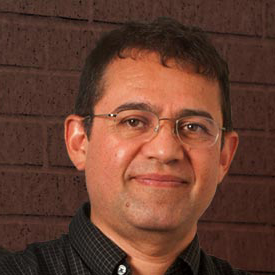
- This event has passed.
Jesus De Loera – UC Davis
October 1, 2018 @ 3:30 pm - 4:30 pm

Bio: Jesús De Loera was born and raised in Mexico City. He received his Bachelor of Science degree in Mathematics from the National University of Mexico in 1989, a M.A. in Mathematics from Western Michigan in 1990, and a Ph.D in Applied Mathematics from Cornell University in 1995. He arrived at UC Davis in 1999, where he is now a professor of Mathematics as well as a member of the Graduate groups in Computer Science and Applied Mathematics. He has held visiting positions at the University of Minnesota, the Swiss Federal Technology Institute (ETH Zürich), the Mathematical Science Institute at Berkeley (MSRI), Universität Magdeburg (Germany), the Institute for Pure and Applied Mathematics at UCLA (IPAM), the Newton Institute of Cambridge Univ. (UK), and the Technische Universität München. He has taught courses at universities in the USA, Mexico, Germany and Switzerland.
He is an expert in the field of Discrete Mathematics, but his research encompasses a diverse set of topics including his work in (pure) Convex Geometry, Algebraic Combinatorics, and Combinatorial Commutative Algebra, as well as his (applied) work in Combinatorial Optimization and Algorithms. In addition to more than 80 published research papers, he has co-written two graduate level textbooks: “ Triangulations: Structures for Algorithms and Applications” (Springer, with J. Rambau and F. Santos) and “ Algebraic and Geometric Ideas in the Theory of Discrete Optimization” (SIAM, with R. Hemmecke and M. Koeppe). The first being a treatise about combinatorics of triangulations of polytopes and the second an introduction to the state of the art in algebraic-geometric algorithms in optimization.
In general, he enjoys rethinking Mathematics in terms of algorithmic questions and understanding how computers can be “taught” to discover or prove theorems (e.g., automatically produce rational generating functions from geometric counting questions). He approaches difficult computational problems using tools from Algebra, Combinatorics, and Convex Geometry, and Topology. He believes in the exciting future of interdisciplinary work. Some of his favorite mathematical objects are polytopes, which are multidimensional generalizations of polygons and cubes.